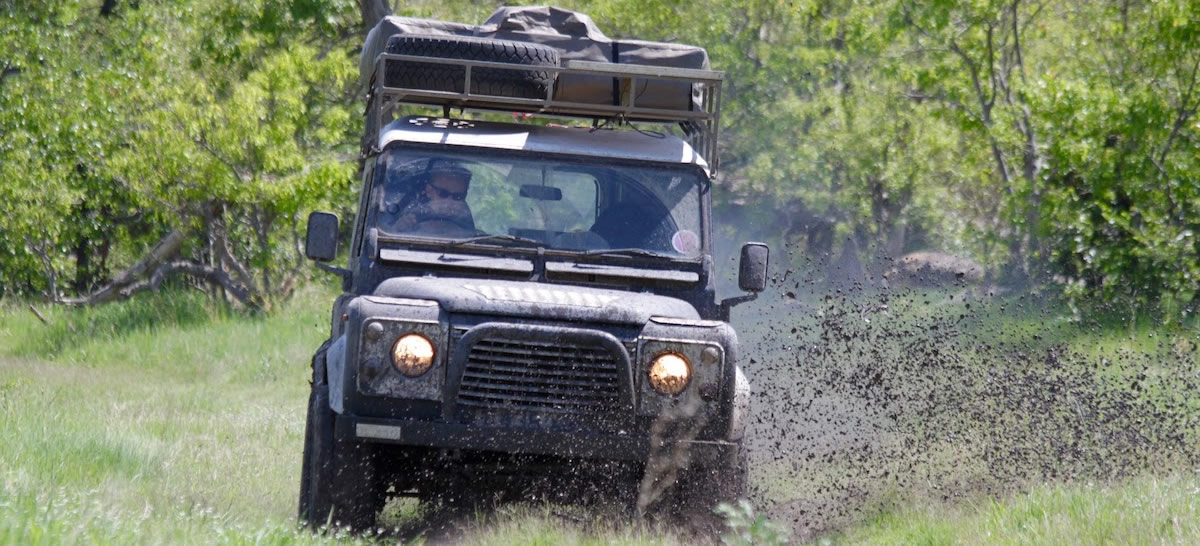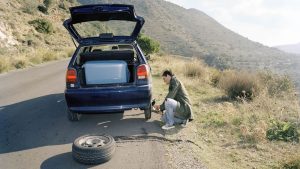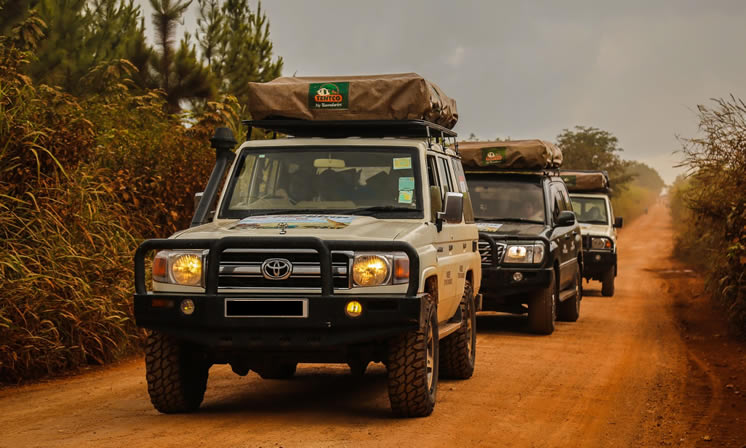
In case you planning to take a long overland adventure around Africa, that is the best choice every adventurous traveler could think about. Who couldn’t be excited about going on a self-drive overland safari to this amazing continent blessed with a variety of wildlife and beautiful landscapes?
Below are some of the important travel tips you should put in mind when planning an overland self-drive adventure that will help you enjoy Africa to the fullest and also make the most of your self-drive overland safari.
1. Learn some basic mechanic skills

Changing Tire on a Roadside
Before you think about planning a self-drive safari to any African country, at least get the time and learn some simple mechanic tips like at least being able to change tires just in case you get a flat tire when you a safari. This is one of the common issues tourists on a self-drive safari in Africa face. Since all safari vehicles come with spare tires and tools, knowing how to change tires will save you time because you will not need to call the car rental agency to send you someone or to show you how to change it.
Another thing, also at least learn how to tighten the battery terminals, since most roads in national parks are bumpy, it’s easy for the battery to get lost the thing which can lead to the vehicle failing to start, in most cases when you see the vehicle as failed to start the first thing to check is the battery terminal and if you find that they are loose, you will need to get a spanner and tighten them.
There are also some things you have to learn to check every few days of the safari. Like is advisable to check your water levels in the radiator, windscreen wipers, oil level, brake fluid level, and tire pressure, and check also the lights, and other things for your safety on the road.
2. Don’t expect brand new 4×4 cars in Africa

4×4 Land Cruisers For Self-Drive Hire in Africa
Since most African countries drive second-hand vehicles from Japan, you should not expect brand new vehicles when hiring a vehicle for a self-drive adventure in Africa but safari car rental company do maintain their vehicles and service them regularly so that they won’t disappoint you when you are on a safari. So don’t be surprised if you get a 2002 model vehicle to take for a safari that can take something like 10,000 km.
Driving an old vehicle on an African safari is also part of the adventure because you will be used to driving a new vehicle in your home country so you should consider driving an old vehicle model as part of an adventure.
3. Road Conditions
Most roads in African national parks are in bad condition and it’s advisable to at least do some research and know how many kilometers you will have to drive on a gravel road and how many kilometers you will drive on a tarmac road so that you can be able to manage your travel time well. When someone mentions African safari this mostly means driving a lot on gravel roads.
4. Music is important
An open road and the largely blue sky can be so damn dazzling however music helps keep the long drive vivacious and energized. You need to take enough time like 2 or 3 months to work on your playlist as you plan your overland safari. Since African safari means a lot of driving, you definitely will not want to hear similar tunes again and again. Also, you can simply disregard streaming music or listening to radio broadcasts, when are in the middle of nowhere. While gathering your playlist, let others also take part so that everyone’s preferences are catered for.
5. Cash
Old people have a saying that states “Cash is everything” This is true in Africa more than anywhere else in the world. However, paying with a credit card is becoming common, however, there is always that interesting moment when you are in the middle of nowhere and you will need cash to pay for something and when there is no ATM in sight. So, whenever you leave a town center where there is access to a banking system make sure you budget your safari well and get enough cash to take you through until you will reach the next town center.
6. Border crossing
When it comes to the issue of crossing the border there are some things you should keep in mind, because self-driving overland safari always includes crossing from one country to another. The day you have to cross the border to another country, you have to prepare yourself very well with all the papers you need and the requirements you need to cross to a certain country. Most border posts will request vehicle registration documents, and will also require you to buy a temporary Import Permit (TIP), Third third-party insurance, but in most cases, if you buy a COMESA instead of Third-party Insurance, you can save much because that yellow card work in many countries like Burundi, Democratic Republic of Congo, Djibouti, Eritrea, Ethiopia, Kenya, Malawi, Rwanda, Sudan, Tanzania, Uganda, Zambia, and Zimbabwe. It’s also advisable to do serious research on what you will need to have in the car to drive in a certain country. Because some countries will need you to have a 5kg fire extinguisher, first aid kit, reflective triangles, and reflective jacket. So be sure to have all those in your vehicle.
7. Night-time Driving
There is nothing dangerous like driving at night in Africa most especially in the rural areas and that is why road trippers and overlanders should try to avoid it at all costs. This is because some parts of Africa are not safe at night and also when it comes to the road networks, some sections are shockingly bad and littered with livestock, and that is so hard to navigate successfully during daytime. Another thing. In addition, most roads in Africa lack street lights and traffic signs so it’s easy to miss a turn or a signpost for a lodge when driving at night.
8. Ask for an Air-conditioned vehicle
Since most African safari means spending much time in a vehicle traveling from one national park to another, it’s better to spend all that time when you are comfortable in an air-conditioned vehicle. In addition to that, some African countries like Namibia, Botswana, and others that have simi-arid types of climates are very hot during daytime the thing which will need you to have a vehicle with a working air conditioner.
9. Be Prepared for the Locals’ Gaze
Am sure everyone is aware that Africans are the friendliest and most welcoming people on this planet earth. So, when you set off for an Overland safari in Africa when you are not in a regular tourist handout, don’t be scared of seeing kids running after your 4×4, waving and smiling at you when you pass in a village. The adults also will gaze at you, and you might feel embarrassed. However, recollect it is just curiosity and that’s all. Locals will always be ready to help if the need emerges.
Passing out sweets and other gifts to village kids is not advisable. However, you can think of giving them books, pens, or paper. If you think the village is poor, you can also give out food to the guardians. This is because if you give something to one kid, you can cause a fight among them. In this way, ensure you give all the kids the same thing.
10. Learn to be Self-sufficient
Africa is wonderful, wide, and wild content. In this way, when you preparing your self-drive overland safari, recall help will not be close at hand. Always remember to carry important things like enough water supply, jack, axe, sand ladders, two extra tires, and winch and tow ropes. Additionally, figure out how to utilize these things the right way so you can resolve the problems that can happen during your safari.
The last thing you want is your safari vehicle getting stuck in the sand on your Kalahari safari or in mud on your game drive in Serengeti National Park and not understanding how to get your vehicle out. Preparing well for the wilderness will help you get out of challenging situations with ease.


